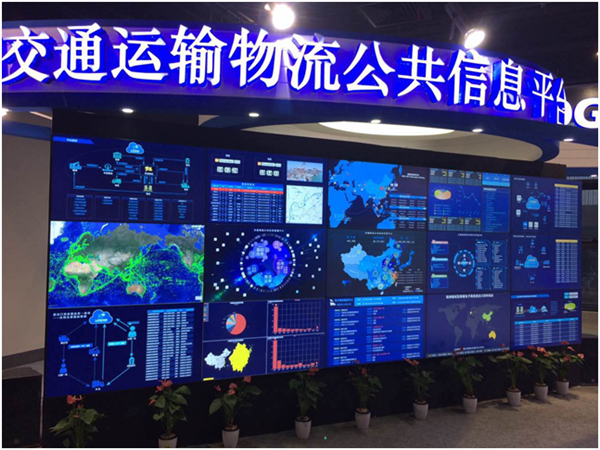Zhejiang rides high on smart logistics
Setting up a comprehensive system to record and analyze logistics data across the whole country is no easy task, and requires truckloads of persistence.
Zhejiang has been travelling down this road for a considerable time, delivering success at each stop.
The province's National Public Platform for Transport and Logistics (LOGINK) is the country's one and only logistics platform, and is being showcased at the 3rd World Internet Conference (WIC) held in Wuzhen.

The platform showcases their information and data system at the Light of Internet expo in Wuzhen. [Photo by Le Qin/chinadaily.com.cn]
LOGINK utilizes data collection software, sharing information among users, allowing for the precise tracking and recording of all deliveries across the country.
By collecting all data and having it one place makes life much easier for logistics companies, allowing them to make analyses, increase efficiency, and save money – with those savings then being passed on to the consumer.
Kang Xinmao, director at the publicity center of Zhejiang provincial department of Communications, said that those who initiated the project had tremendous foresight.

Kang Xinmao talks about the development of the comprehensive logistics data platform.[Photo by Le Qin/chinadaily.com.cn]
"When we set up the platform in 2008, the information industry was in its early phase,and our platform was only meant for bringing out solutions for logistic in the province," said Kang. "As for me, a bystander then, the government took a long-term view to take the responsibility of logistic information integration to push for the informatization of the industry."
Letting the government and the market play to their strengths is one of the main reasons for the progress of the platform, according to Kang. The government, using its credibility and public function, established a public platform with standards, connecting with each part in the industry. Different information from different systems is then linkedand all information is assigned to enterprises for their needs. The interconnection of data fostered the development of the platform, enabling it to attract more users and gather yet more data.
"We also explored and sought for cooperation with enterprises to further develop the platform," Kang said. "For instance, we joined hands with Transfar (a leading road transport service provider in Zhejiang) to learn from their road-port model, from which we gained experience in progressing with the informatization of logistics parks."
Taking the lead role in information technology is nothing new for Zhejiang. The province has a reputation for strongly supporting entrepreneurship, and promoting innovation in new fields.
One of the most important applications of the platform is the Northeast Asia Logistics Information Service Network (NEAL-NET), a regional cooperation and exchange mechanism, promoting logistic information interconnection of ships, port and containers, mainly among China, Japan and South Korea.
Currently,the system also works to serve in the application in the Belt and Road Initiative, cooperating with ASEAN countries as well as the US. In 2014, it was listed in the medium and long-term development plan of the logistics industry, released by the State Council.
At present, the platform has been fully applied in Zhejiang province, while stepping out to reach more places in the country, such as setting up cooperation with Zhuhai port in Guangdong province or the Shanghai Railway. Eyeing the future for this platform, also for integrating information technologies with traditional logistics, Kang said they will need to look at the processing of data.
"We want to make the platform a user-friendly one, like what Alibaba or Tencent have developed. Unlike enterprises, the government is striving for public welfare for free. Once we optimize our products and bring more participants to the table, we can further cut the cost of the whole supply chain."

 Print
Print Mail
Mail
 20 Cultural Symbols
20 Cultural Symbols Why Zhejiang
Why Zhejiang Experiencing high-tech products at WIC
Experiencing high-tech products at WIC Zhejiang Release
Zhejiang Release Zhejiang News
Zhejiang News